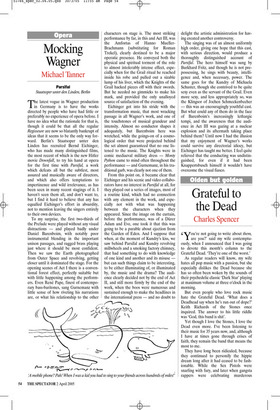Mocking Wagner
Michael Tanner
Parsifal
Staatsoper unter den Linden, Berlin
Tihe latest vogue in Wagner production n Germany is to have the works directed by people who have had little or preferably no experience of opera before. I have no idea what the rationale for that is, though it could be that all the regular Regisseure are now so blatantly bankrupt of ideas that it seems to be the only way forward. Berlinâs Staatsoper unter den Linden has recruited Bernd Eichinger, who has made many distinguished films, the most recent of which is the new Hitler movie Downfall, to try his hand at opera for the first time with Parsifal, a work which defeats all but the subtlest, most assured and musically aware of directors, and which also offers temptations to impertinence and wild irrelevance, as has been seen in many recent stagings of it. I havenât seen them all, and donât want to, but I find it hard to believe that any has equalled Eichingerâs effort in absurdity, not to mention leaving the singers entirely to their own devices.
To my surprise, the first two-thirds of the Prelude were played without any visual distractions â and played badly under Daniel Barenboim, with notably poor instrumental blending in the important unison passages, and ragged brass playing just where it should be most confident. Then we saw the Earth photographed from Outer Space and revolving, getting closer until it dominated the stage. For the opening scenes of Act I there is a conventional forest effect, perfectly suitable but with little happening among the performers. Even RenĂ© Pape, finest of contemporary bass-baritones, sang Gurnemanz with little sense of how riveting his narrations are, or what his relationship to the other characters on stage is. The most striking performance by far, in this and Act III, was the Amfortas of Hanno MuellerBrachmann (substituting for Roman Trekel), clearly destined to be a major operatic presence. He conveyed both the physical and spiritual torment of the role to almost intolerably intense effect, especially when for the Grail ritual he reached inside his robe and pulled out a sizable lump of his liver, which the Knights of the Grail hacked pieces off with their swords. But he needed no gimmicks to make his mark, and provided the only unalloyed source of satisfaction of the evening.
Eichinger got into his stride with the transformation music, that most wracking passage in all Wagnerâs work, and one of the touchstones of musical grandeur and intensity. Almost no conductor shapes it adequately, but Barenboim here was wretched, while the goings-on of a cosmological order that were projected behind the set almost guaranteed that no one listened to the music. The Knights were in comic mediaeval military dress â Monty Python came to mind often throughout the performance â and Gurnemanz, in his traditional garb, was clearly not one of them.
From this point on, it became clear that Eichinger and his scenic and video collaborators have no interest in Parsifal at all, for they played out a series of images, most of a routine kind, which had no connection with any element in the work, and especially not with what was happening between the characters when they appeared. Since the image on the curtain, before the performance, was of a DĂŒrer Adam and Eve, one took it that this was going to be a parable about ejection from the Garden of Eden. And I suppose that when, at the moment of Kundryâs kiss, we saw behind Parsifal and Kundry revolving millwheels and a smoking factory chimney, that had something to do with knowledge of one kind and another and its misuse but can such things claim to be interesting, to be either illuminating of, or illuminated by, the music and the drama? The audience clearly decided not by the end of Act II, and still more firmly by the end of the work, when the boos were numerous and sustained enough to make the headlines in the international press â and no doubt to delight the artistic administration for having created another controversy.
The singing was of an almost uniformly high order, giving one hope that this cast, with serious direction, would produce a thoroughly distinguished account of Parsifal. The hero himself was sung by Burkhard Fritz, and though he is not prepossessing, he sings with beauty, intelligence and, when necessary, power. The same goes for the Kundry of Michaela Schuster, though she contrived to be quite sexy even as the servant of the Grail. Even more sexy, and less appropriately so, was the Klingsor of Jochen Schmeckenbecher â this was an encouragingly youthful cast. But what could any of them do in the face of Barenboimâs increasingly lethargic tempi, and the awareness that the audience in Act III was gazing at a nuclear explosion and its aftermath taking place behind them? Until now I had the illusion that my enjoyment of Wagnerâs works could survive any directorial idiocy, but Eichinger has taught me better. I feel quite relieved that the conducting was undistinguished, for even if it had been Knappertsbusch himself it wouldnât have overcome the visual fiasco.





























































 Previous page
Previous page